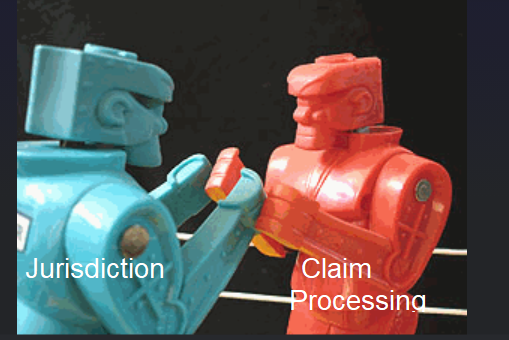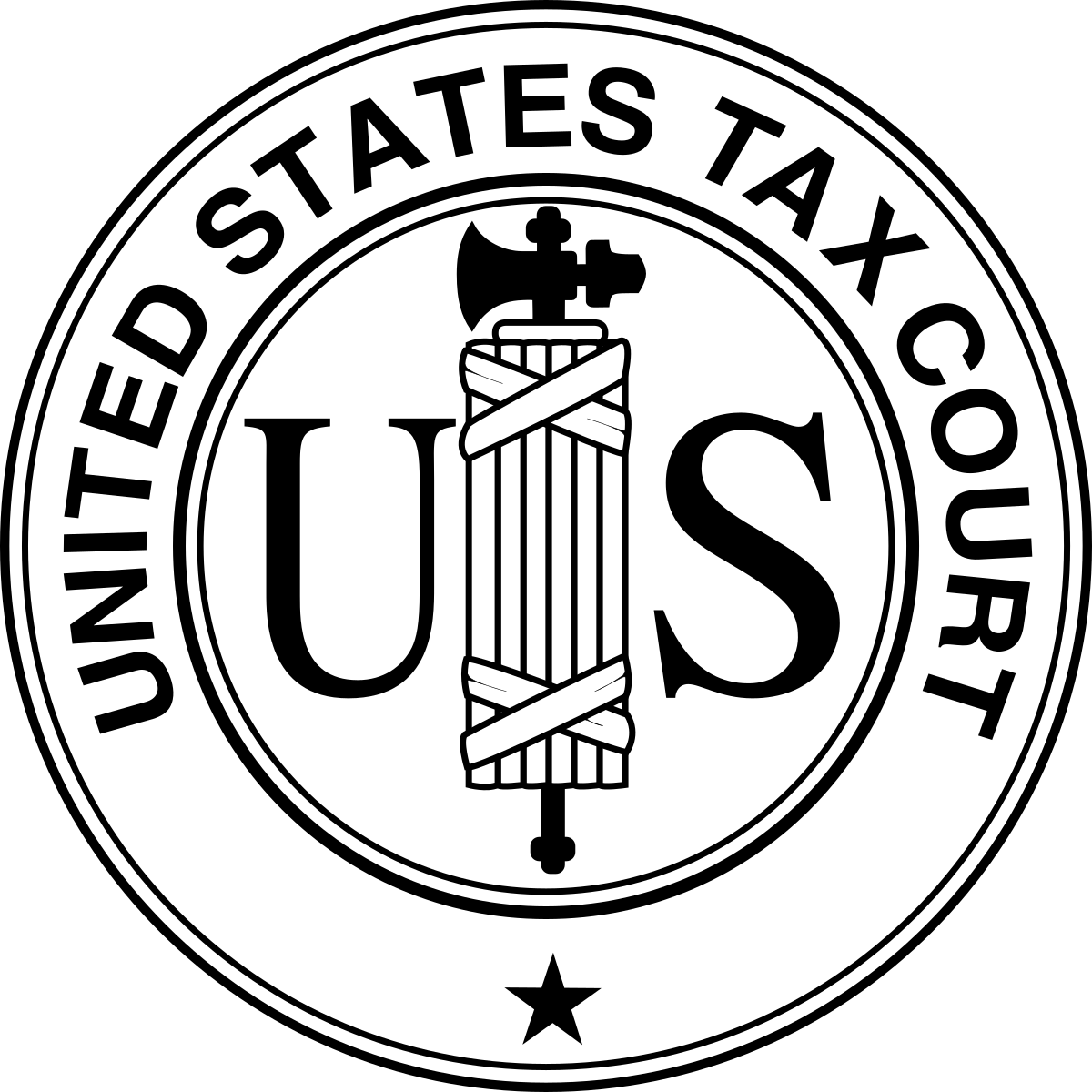 An important question about statutes bearing on the ability of a federal court to hear a matter is whether they are “jurisdictional,” or only speak to issues of “claim-processing.” See, e.g., Reed Elsevier, Inc. v. Muchnick, 559 U.S. 154 (2010). In Rivero v. Fidelity Investments, “[e]xamining the text and structure of the [Declaratory Judgment Act]’s federal-tax exception” led to the conclusion that it was jurisdictional: “[T]he statute plainly ‘speak[s] to the power of the court.’ … [T]he juxtaposition of the DJA’s reference to federal courts’ jurisdiction and the federal-tax exception indicates that the latter deprives a court of jurisdiction that might otherwise exist in cases ‘with respect to Federal taxes.'” The court also noted holdings in cases about a similarly-worded provision of the Anti-Injunction Act. No. 20-40371 (June 10, 2021) (citations omitted).
An important question about statutes bearing on the ability of a federal court to hear a matter is whether they are “jurisdictional,” or only speak to issues of “claim-processing.” See, e.g., Reed Elsevier, Inc. v. Muchnick, 559 U.S. 154 (2010). In Rivero v. Fidelity Investments, “[e]xamining the text and structure of the [Declaratory Judgment Act]’s federal-tax exception” led to the conclusion that it was jurisdictional: “[T]he statute plainly ‘speak[s] to the power of the court.’ … [T]he juxtaposition of the DJA’s reference to federal courts’ jurisdiction and the federal-tax exception indicates that the latter deprives a court of jurisdiction that might otherwise exist in cases ‘with respect to Federal taxes.'” The court also noted holdings in cases about a similarly-worded provision of the Anti-Injunction Act. No. 20-40371 (June 10, 2021) (citations omitted).
Category Archives: Tax
 If MoneyGram is a “bank” under the applicable Internal Revenue Code provision, it can take a large deduction that it cannot otherwise take. The Fifth Circuit did not agree with its claim to be a bank: “MoneyGram contends that when a customer buys a money order, the customer is placing funds with MoneyGram for safekeeping, at least until such time as the recipient of the money order presents it for payment. The tax court rejected this argument, likening a money order to the purchase of a gift card rather than a deposit in a bank account. We agree.” MoneyGram Int’l v. Commissioner of Internal Revenue, No. 20-60146 (June 1, 2021).
If MoneyGram is a “bank” under the applicable Internal Revenue Code provision, it can take a large deduction that it cannot otherwise take. The Fifth Circuit did not agree with its claim to be a bank: “MoneyGram contends that when a customer buys a money order, the customer is placing funds with MoneyGram for safekeeping, at least until such time as the recipient of the money order presents it for payment. The tax court rejected this argument, likening a money order to the purchase of a gift card rather than a deposit in a bank account. We agree.” MoneyGram Int’l v. Commissioner of Internal Revenue, No. 20-60146 (June 1, 2021).
 An IRS limitations statute runs from the filing of the “return” in question. The issue in Quezada v. IRS was whether the filing of a return–but the wrong type of return–starts the clock running. The Fifth Circuit found that it did, so long as it contained information from which the taxpayer’s claimed error could be identified: “Accordingly, consistent with a plurality of our sister circuits, we think the better reading of [Supreme Court precedent] is that the taxpayer is not required to file the precise return prescribed by treasury regulations in order to start the limitations clock. Instead, ‘the return’ is filed, and the limitations clock begins to tick, when the taxpayer files a return that contains data sufficient (1) to show that the taxpayer is liable for the tax at issue and (2) to calculate the extent of that liability.” No. 19-5100-CV (Dec. 11, 2020).
An IRS limitations statute runs from the filing of the “return” in question. The issue in Quezada v. IRS was whether the filing of a return–but the wrong type of return–starts the clock running. The Fifth Circuit found that it did, so long as it contained information from which the taxpayer’s claimed error could be identified: “Accordingly, consistent with a plurality of our sister circuits, we think the better reading of [Supreme Court precedent] is that the taxpayer is not required to file the precise return prescribed by treasury regulations in order to start the limitations clock. Instead, ‘the return’ is filed, and the limitations clock begins to tick, when the taxpayer files a return that contains data sufficient (1) to show that the taxpayer is liable for the tax at issue and (2) to calculate the extent of that liability.” No. 19-5100-CV (Dec. 11, 2020).
 The Fifth Circuit affirmed a Tax Court decision about a $52 million “bad debt” deduction, observing: “Baker Hughes’ authorities all involved a bona fide debt. … No authority shown to us holds that a bad-debt deduction applies to a guarantor’s payment on a guarantee that does not create a debtor-creditor relationship with the party whose original obligation is extinguished.” Baker Hughes Inc. v. United States, No. 18-20585 (Nov. 21, 2019).
The Fifth Circuit affirmed a Tax Court decision about a $52 million “bad debt” deduction, observing: “Baker Hughes’ authorities all involved a bona fide debt. … No authority shown to us holds that a bad-debt deduction applies to a guarantor’s payment on a guarantee that does not create a debtor-creditor relationship with the party whose original obligation is extinguished.” Baker Hughes Inc. v. United States, No. 18-20585 (Nov. 21, 2019).
 “[A]lthough a loan provides money to the borrower that can be used for temporary economic gain, it is offset by a future obligation to repay. As there is no overall
“[A]lthough a loan provides money to the borrower that can be used for temporary economic gain, it is offset by a future obligation to repay. As there is no overall
improvement in the borrower’s economic situation, there is no gain to be taxed. This contrasts with the taxable treatment of embezzled or misappropriated
funds. A leading tax treatise calls this the ‘theft-loan dichotomy’ that James [v. United States, 366 U.S. 213 (1961)]s] ‘no consensual recognition of an obligation to repay’ requirement seeks to enforce.” (other citations omitted). Accordingly: “‘A mutual understanding that Sun would ‘return some money to Mr. Cheung at some point’ is thus not enough to constitute the bona fide loan that would allow Sun to avoid reporting as income the millions he used to gamble, to bolster the financial condition of his
company, and to produce investment returns that he retained and commingled
with his other funds.” Sun v. Commissioner, No. 16-60270 (Jan. 18, 2018).
 The issue in Moneygram Int’l v. Commissioner of Internal Revenue was whether MoneyGram could take advantage of a favorable deduction rule for “banks,” unhelpfully defined in the Internal Revenue Code with a sentence beginning: “[T]he term ‘bank’ means a bank or trust company . . . .” Turning to the specific requirements of the definition, the Fifth Circuit concluded that the Tax Court “erred by interpreting
The issue in Moneygram Int’l v. Commissioner of Internal Revenue was whether MoneyGram could take advantage of a favorable deduction rule for “banks,” unhelpfully defined in the Internal Revenue Code with a sentence beginning: “[T]he term ‘bank’ means a bank or trust company . . . .” Turning to the specific requirements of the definition, the Fifth Circuit concluded that the Tax Court “erred by interpreting  ‘deposit’ to include the requirement that MoneyGram ‘hold its customers’ funds for extended periods of time,'” and by requiring that a “loan” be made for interest. A dissent criticized the majority’s “[n]itpicking some of the definitions of a loan . . . .” No. 15-60527 (Nov. 15, 2016, unpublished).
‘deposit’ to include the requirement that MoneyGram ‘hold its customers’ funds for extended periods of time,'” and by requiring that a “loan” be made for interest. A dissent criticized the majority’s “[n]itpicking some of the definitions of a loan . . . .” No. 15-60527 (Nov. 15, 2016, unpublished).
 A detailed review of tax statutes and other authorities resulted in affirmance of a judgment against Bombardier related to the taxation of its “Flexjet” program; the Court summarized: “Because the law and its application to the real world is continually evolving, it is only natural that guidance in Revenue Rulings evolves too. We find a consistent theme, though, in the IRS’s guidance from the earliest Revenue Rulings grappling with this issue: where an entity is responsible for nearly every service and precondition necessary to transport persons in an aircraft, and it charges for those services, it is providing taxable transportation – even if the bona fide owner of the aircraft itself is the person traveling.” Bombardier Aerospace Corp. v. United States, No. 15-10468 (July 25, 2016).
A detailed review of tax statutes and other authorities resulted in affirmance of a judgment against Bombardier related to the taxation of its “Flexjet” program; the Court summarized: “Because the law and its application to the real world is continually evolving, it is only natural that guidance in Revenue Rulings evolves too. We find a consistent theme, though, in the IRS’s guidance from the earliest Revenue Rulings grappling with this issue: where an entity is responsible for nearly every service and precondition necessary to transport persons in an aircraft, and it charges for those services, it is providing taxable transportation – even if the bona fide owner of the aircraft itself is the person traveling.” Bombardier Aerospace Corp. v. United States, No. 15-10468 (July 25, 2016).
 The Howard Hughes Company sold lots, and provided necessary infrastructure, in a planned development near Las Vegas. The IRS did not let it take advantage of a special gain calculation for “home construction contracts,” and the Fifth Circuit agreed. The key statutory interpretation principle (after the basic one that tax exemptions are strictly construed) was “the rule against superfluities,” under which an argument about one statutory provision fails if it makes another one redundant. Howard Hughes Co. v. Commissioner of Internal Revenue, No. 14-60915 (revised Dec. 7, 2015).
The Howard Hughes Company sold lots, and provided necessary infrastructure, in a planned development near Las Vegas. The IRS did not let it take advantage of a special gain calculation for “home construction contracts,” and the Fifth Circuit agreed. The key statutory interpretation principle (after the basic one that tax exemptions are strictly construed) was “the rule against superfluities,” under which an argument about one statutory provision fails if it makes another one redundant. Howard Hughes Co. v. Commissioner of Internal Revenue, No. 14-60915 (revised Dec. 7, 2015).
Susan Rothkamm sued for wrongful levy, after the IRS seized a CD in her name to satisfy a tax liability of her husband. The Fifth Circuit reversed the dismissal of her claim, finding that she had standing as a “taxpayer” under the broad definition of 7701 of the Internal Revenue Code: “The term ‘taxpayer’ means any person subject to any internal revenue tax.” The Court also found that limitations was tolled during the pendency of her application for a Taxpayer Assistance Order, and that the IRS did not have discretion to affect the length of that tolling period. Rothkamm v. United States, No. 14-31164 (Sept. 21, 2015). A dissent warned: “I dissent from the majority’s newly minted tolling rule. While this creativity is driven by a desire to achieve fairness, it suffers the vice common to such endeavors – it does the opposite by disrupting a carefully structured regime for the resolution of disputes between the IRS and property owners.”
Pursuant to section 965 of the Internal Revenue Code, BMC Software repatriated to the United States several hundred million dollars of income earned by a foreign subsidiary. It earned a substantial tax deduction for the year, as this provision is intended to incentivise the fresh investment of foreign cash into the U.S. by companies with international operations. BMC Software v. Commissioner of Internal Revenue, No. 13-60684 (March 13, 2015). Some time later, BMC settled a dispute about the tax treatment of royalties paid to it by the same subsidiary. The IRS then took the position that BMC’s accounting for that dispute amounted to a loan, which would lead to the disallowal of some of the section 965 deduction (loaning money to a subsidiary who then returns it to the US would not be fresh investment). The Fifth Circuit rejected that position and reversed the Tax Court, finding no support for it in either the statute or the settlement document. Because the accounts receivable created as a result of the settlement were not created until after the applicable tax year, the statutory exception for loaned funds could not apply.
 As part of a sale transaction, the board of “Gold Kist” (more widely known as Pilgrim’s Pride), decided to abandon certain securities for no consideration. For tax purposes, the company then reported a $98.6 million ordinary loss. Pilgrim’s Pride Corp. v. Commissioner of Internal Revenue, No. 14-60295 (Feb. 25, 2015). The IRS contended that this was a capital loss, rather than an ordinary loss, creating a tax deficiency of close to $30 million. The Court agreed with the company, finding: “By its plain terms, [26 U.S.C.] § 1234A(1) applies to the termination of rights or obligations with respect to capital assets (e.g. derivative or contractual rights to buy or sell capital assets). It does not apply to the termination of ownership of the capital asset itself.” In rejecting a contrary view of the statute, Judge Elrod gives a powerful summary of several canons of construction: “We disagree. Congress does not legislate in logic puzzles . . . “
As part of a sale transaction, the board of “Gold Kist” (more widely known as Pilgrim’s Pride), decided to abandon certain securities for no consideration. For tax purposes, the company then reported a $98.6 million ordinary loss. Pilgrim’s Pride Corp. v. Commissioner of Internal Revenue, No. 14-60295 (Feb. 25, 2015). The IRS contended that this was a capital loss, rather than an ordinary loss, creating a tax deficiency of close to $30 million. The Court agreed with the company, finding: “By its plain terms, [26 U.S.C.] § 1234A(1) applies to the termination of rights or obligations with respect to capital assets (e.g. derivative or contractual rights to buy or sell capital assets). It does not apply to the termination of ownership of the capital asset itself.” In rejecting a contrary view of the statute, Judge Elrod gives a powerful summary of several canons of construction: “We disagree. Congress does not legislate in logic puzzles . . . “
Mingo sold her partnership interest in PWC to IBM; part of its value included $126,240 of unrealized receivables. She sought to report them for tax purposes using the installment method of accounting. The IRS disagreed and the Tax Court and Fifth Circuit accepted its position. Mingo v. Commissioner of Internal Revenue, No. 13-60801 (Dec. 9, 2014). The underlying statute, section 741 of the Internal Revenue Code, provides that sale of a partnership interest is ordinarily considered the sale of a capital asset, except for gain from unrealized receivables; the purpose “is to prohibit ordinary income from being transformed into capital gains (which is taxed more favorably) simply by being passed through a partnership and sold.”
Estate of Elkins v. Commissioner of Internal Revenue presented a dispute about the taxable value of a decedent’s fractional ownership in an extremely valuable art portfolio, including works by Picasso, Jackson Pollock, and Cezanne. No. 13-60742 (Sept. 15, 2014). Before the U.S. Tax Court, the IRS “steadfastly maintained that absolutely no fractional-ownership discount was allowable.” The estate offered expert testimony that “any hypothetical willing buyer would demand significant fractional-ownership discounts in the face of becoming a co-owner with the Elkins descendants, given their financial strength and sophistication, their legal restraints on alienation and partition, and their determination never to sell their interests in the art.”
The Tax Court applied a “‘nominal’ discount of 10 percent only.” The Fifth Circuit reversed: “[T]he Estate’s uncontradicted, unimpeached, and eminently credible evidence in support of its proferred fractional-ownership discounts is not just a ‘preponderance’ of such evidence; it is the only such evidence. Nowhere is there any evidentiary support for the Tax Court’s unsubstantiated declaration” about the 10% discount (emphasis in original). In reviewing the IRS’s “no discount” position at trial, the Court noted in footnote 7: “The Commissioner appears to have ignored, or been unaware of, the venerable lesson of Judge Learned Hand’s opinion in Cohan: In essence, make as close an approximation as you can, but never use a zero.” Cohan v. Commissioner, 39 F.2d 540, 543-44 (2d Cir. 1930).
Trying to set up a “Special Limited Investment Partnership” to reduce taxes, Dow Chemical contributed 73 patents to a partnership with several foreign banks, which licensed the patents back to Dow. Chemtech Royalty Assocs. v. United States, No. 13-30887 (Sept. 10, 2014). The Fifth Circuit affirmed the finding of a “sham partnership,” noting three points: (1) the transaction was structured to ensure the banks a fixed annual return on investment; (2) Dow agreed to bear all material risks arising from the transactions; and (3) the banks did not meaningfully share in any potential upside. The Court dismissed several case citations by Dow as elevating form over substance. The Court concluded by vacating and remanding as to penalty — the district court concluded that that “it could not impose a valuation-misstatement penalty when an entire transaction has been disregarded,” but since that ruling, the Supreme Court suggested that it was as least possible to do so in United States v. Woods, 134 S. Ct. 557 (2013).
The question in Salty Brine I, Ltd. v. United States was whether a complicated transaction involving an oil and gas project was an inappropriate assignment of income to avoid income tax. No. 13-10799 (July 31, 2014). Reviewing the basic principles of the “assignment of income” doctrine, the Fifth Circuit found no clear error in the district court’s findings that the taxpayers “were in control of the entire transaction.” In summarizing the doctrine, the Court quoted a metaphor from a 1930 opinion by Justice Holmes — that income tax may not be avoided through an “arrangement by which the fruits are attributed to a different tree from that on which they grew.” The court also found that the transaction lacked economic substance, again noting the taxpayer’s control of the entities and money flow.
The unfortunate taxpayer in Whitehouse Hotel Limited Partnership v. Commissioner of Internal Revenue lost a multi-million dollar dispute about the value of an easement, related to the spectacular Ritz-Carlton on Canal Street in New Orleans, and as a result faced a substantial penalty. No. 13-60131 (June 11, 2014). The Fifth Circuit affirmed the Tax Court on the merits but reversed as to the penalty, noting: “We are particularly persuaded by [Taxpayer’s] argument that the Commissioner, the Commissioner’s expert, and the tax court all reached different conclusions” on the core valuation issue. Acknowledging that this area is fact-specific, the Court held as to the taxpayer’s conduct: “Obtaining a qualified appraisal, analyzing that appraisal, commissioning another appraisal, and submitting a professionally-prepared tax return is sufficient to show a good faith investigation as required by law.”
Burnett Ranches, Inc. operates the sprawling Four Sixes and Dixon Creek ranches in the Texas Panhandle; its history runs to Captain Samuel “Burk” Burnett’s land dealings in the 19th Century with Comanche chief Quanah Parker. The IRS contended that its current owner (Captain Burnett’s great-granddaughter) was subject to accrual rather than cash accounting pursuant to a law against “farm syndicate” tax shelters. Burnett Ranches v. United States, No. 13-10403 (May 22, 2014). The Fifth Circuit affirmed summary judgment for the ranch as to an exception to that law for active farm operators: “To accept the government’s overly expansive reading of § 464 by crediting its overly narrow reading of the Active Participation Exception would be to sanction ‘administrative legislation’ by an Article II executive agency. This we decline to do, agreeing instead with the district court that the government’s efforts fail, grounded as they are in nothing more than the fact that legal title to Ms. Marion’s interest in Burnett Ranches stands in the name of her S corp.” Of general interest, the Court concluded that “interest” has a broad, nontechnical meaning so long as it does not have a “narrowing modifier.”
A painstaking panel issued two detailed tax opinions on the same day. In the first, “substantial underpayment” penalties were found appropriate, in a partnership-level proceeding, where substantial authority did not support the taxpayer’s position as to a well-known inappropriate tax shelter. NPR Investments LLC v. United States, No. 10-41219 (Jan. 23, 2014). In the second, the Court affirmed a finding that certain claimed tax credits were not “qualified research expenses” within the meaning of the Internal Revenue Code, while also remanding to enforce a stipulation made by government before the Tax Court, In an evidentiary holding of broader interest, the court found no abuse of discretion in the exclusion under Rule 403 of the taxpayers’ alleged lab records, agreeing that they were voluminous and not pertinent to the specific tax law issues at hand. Shami v. Commissioner of Internal Revenue, No. 12-60727 (Jan. 23, 2014). Both opinions discuss the appropriate standards of review for appeal from the U.S. Tax Court.